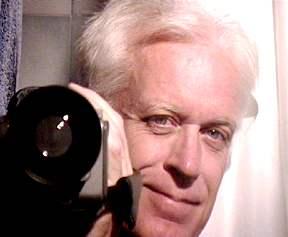
Filmmaker Jon Jost returns to the Ross Nov. 7-13
calendar icon28 Oct 2014
Lincoln, Neb.--In 2007, radical filmmaker Jon Jost came to Lincoln to make movies. He had visited earlier in 1974 as the second filmmaker to participate in the Sheldon Film Showcase (now known as the Norman A. Geske Cinema Showcase).The recipient of an Artist-in-Residence grant co-sponsored by the Mary Riepma Ross Media Arts Center and the University of Nebraska’s Arts Are Basic Program, Jost wound up making two feature films and a visual installation expressing cultural and geographical nuances of life in the Midwest.
Now, seven years and handfuls of films later, Jost is returning to Lincoln to screen these and other works as part of a selective retrospective celebrating his more than fifty years as a filmmaker and artist. The showcase, which runs from Nov. 7-13 at the Mary Riepma Ross Media Arts Center, features a cross-section of Jost’s films from his early celluloid days to his most up-to-date digital work. Those interested in personal filmmaking with little regard for conventional methods won’t want to miss this chance to interact with a legend in the field and see his work on the big screen.
An American maverick who was expelled from college and spent time in jail for refusing the Vietnam War draft, Jost has carved out a distinct presence in the independent film circuit since the 1960s. He’s made more than thirty features, more than thirty shorts, and a healthy handful of visual installations. But few filmmakers can say they’ve “made” a film the way Jost can: he usually serves as the sole conceiver, writer, photographer, editor, and director of his work—a veritable one-man film crew. He collaborates closely with his actors, when applicable, favoring loosely scripted, improvised methods of shooting to nailed-down, schematic filmmaking, while his modes stretch from experimental to essay, fiction to documentary, and all relevant hybrids in between.
Though courted by Hollywood suits here and there, Jost, who calls himself “independently poor,” is staunchly autonomous from corporate oversight, operating outside of the main commercial channels of filmmaking and distribution. (He sells the occasional film from his website.) Nonetheless, his films have screened widely in festivals and museums around the world, including Venice, Berlin, Rotterdam, Yamagata, Jeonju, and a host of others. They’ve also been widely archived in numerous countries, and in 1991 his films were accorded a retrospective at the Museum of Modern Art in New York City. He’s won numerous awards for independent filmmaking, among them the IFP/West John Casavettes Lifetime Achievement Award. He’s also a retired Distinguished Professor at Yonsei University in Seoul, South Korea, where he taught courses in digital filmmaking. Not bad for a self-taught artist who often lives out of his car.
Conventional narrative lines are tough to trace in Jost’s films, but if you don’t depend on such things, his work is visually and cognitively rich. His long-take aesthetic asks audiences to confront his images with earnestness, while numerous passing landscape shots offer spaces for viewer reflection. But surely his films are not to everyone’s taste. Even the most hardened art film cinephile may find his pace glacial, his meanings cryptic, his outlook grim (though these are also elements that appeal to others). Whereas our default cinematic consumption hinges on quick, clear thrusts of exposition and spectacle—real wham-bam filmmaking—Jost offers a highly personal vision that attempts to communicate something essential out of his premises, be they the troubled return of an Iraq war veteran to Oregon, the rubble of the Japanese earthquake and tsunami of 2011, or the delicate zeitgeist of an old Portuguese city. A tinkerer with his digital camera—his mode of choice since it became widely available in the 1990s—he uses a range of techniques to shake up our passivity as visual consumers: split-screens, long dissolves, superimpositions, and experiments with audio tracks and digitized effects feature throughout. These traits go some way toward explaining why French master filmmaker Jean-Luc Godard claimed that “Unlike almost all American directors, Jon Jost is not a traitor to the movies. He makes them move.”
Jost does his own fair share of moving. An Army brat born in Chicago, his family jetted from country to country, state to state, never settling anywhere for long. Jost has continued this trend as a nomadic artist: a residency in Nebraska, a professorship in South Korea, a project in Italy, etc. Most industry-centered filmmakers would find this constant uprooting a roadblock to sustained and settled work on a single film, but Jost sees travel as a chance to make more films about more topics, rendering people and places with genuine attention, not Hollywood glossiness.
His current project involves more movement. Currently driving across the country as he films a sprawling essay-film on the state of the nation, Jost will stop long enough in Lincoln for the retrospective. On Friday, Nov. 7, after the showing of Last Chants for a Slow Dance, Jost will be interviewed on stage by Bill Fech, a PhD student at Concordia University in Montreal, Quebec, and former employee of the Ross.